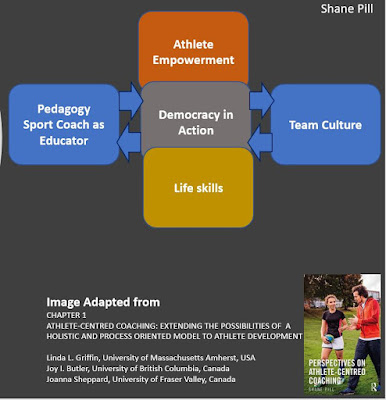The primary practices that encompass athlete-centred sport teaching/coaching
Three primary practices encompass athlete-centred coaching.
- A game-based approach
- Developing players as independent self regulated learners: thinking players
- Team culture
The pedagogy (cluster of teaching styles) selected by the coach is instructive in the empowerment of the players and the practice setting as democracy in action via shared ownership of decisions enabled by distributed leadership. Added to this is a focus on the development of a player's life skills. As former All Black's coach Wayne Smith is famous for saying, "better people make better players". An expanded 'teaching' agenda (developing life skills as well as playing ability), democracy in action and athlete empowerment feed into the development of Team Culture. However, Team Culture also feeds back into these other areas in that the coach does not always have the power or ability to select players with the character to fit the culture they want to develop with the team, especially in semi-professional and community sport environments, and so the culture of the playing group established through the dynamics of the mix of characters also feeds into possibilities of athlete-centred coaching.
Athlete-centred coaching has been found to make players feel more involved with their training and therefore more motivated to perform. Athlete-centred coaching has been found to assist players feeling more confident in their selves and as performers (Bateman, 2013). Some coaches suggest adopting the game-based concept of athlete-centred coaching in individual sports is difficult. However, scholarship in this area has informed coaches of individual sports how to bring the tenets of athlete-centred coaching into these sports.
informs this poster
The central premise behind athlete-centred coaching may be to create an environment where people can thrive as individuals, and by thriving as individuals the anticipation is that the team thrives and the club becomes a highly valued community asset.
If the idea of athlete-centred coaching interests you, I recommend for further reading:
Athlete-centred Coaching: Developing Decision Makers
Athlete Centred Coaching: Developing Inspired and Inspiring People
Perspectives on Athlete-Centred Coaching
The Athlete Centered Coach 107 Reasons It's All About Them
Positive Pedagogy for Sport Coaching: Athlete-centred coaching for individual sports
There is an absence of research on what athlete-centred coaching in school and university/college sport would translate as, and despite the 'character first' policy in talent identification and recruitment that many sports talk about in Australia, a surprising absence of research in general from critical, naturalistic and appreciate perspectives on athlete centred coaching. If this is an area that interests you, please get in touch with me for a chat about what might be possible.
Thanks for stopping by and reading this blog. If you would like to connect with the ideas here or any of the ideas I have blogged about, you can contact via my email here








.JPG)
Comments
Post a Comment